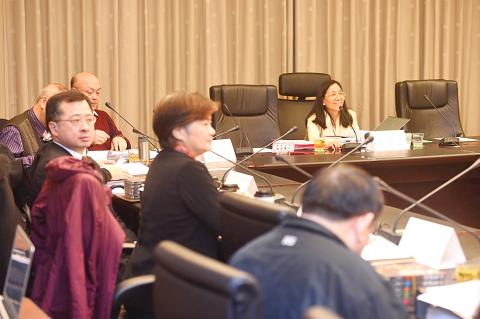Campaigners yesterday protested outside the Presidential Office Building, calling for the implementation of a jury system for criminal trials as a judicial reform subcommittee gathered to discuss possible reform measures.
Headed by former grand justice Hsu Yu-hsiu (許玉秀), the subcommittee focused on a proposal to allow public participation in the judiciary and to have “lay assessors” take part in the criminal justice system, measures which have been long sought after by many members of the public and legal reform advocates.
The subcommittee discussed two proposals: one involving a jury system with 12 jurors, in line with the British and US legal systems; and a participatory jury system, which has more limited public participation of six jurors, in which the jury’s decision can be disregarded on stated opinions given by the judges.

Photo: George Tsorng, Taipei Times
Previous Chinese Nationalist Party (KMT) governments and most judiciary officials favor the participatory system, with the Judicial Yuan and the Executive Yuan introducing legislation in 2012 for its implementation.
However, the proposal has been met with criticism and opposition from most judicial reform advocates, who have called for a jury trial system that gives the jury the power to reach a decision in criminal prosecution cases.
The protest was organized by Taiwan Jury Association, and was attended by members of Citizen Congress Watch, the Northern Taiwan Society, the Taiwan Citizen Participation Association, Taiwan Forever and other civic organizations.
“We are opposed to the position taken by the Judicial Yuan and by many of the members of the judicial reform subcommittee. They advocate the participatory jury system, which is judicial reform by fake means,” said Taiwan Jury Association chairman Chang Ching (張靜), who is a member of the subcommittee that convened yesterday.
“Civic organizations and legal experts have assessed the two systems, and have concluded that only by implementing the jury trial system can true public participation and transparency be realized to reflect the wishes and aspirations of society,” Chang said.
Northern Taiwan Society chairman Chang Yeh-shen (張葉森) said the jury trial system is the only way to end the shady operations of the justice system, which is fraught with personal bias, corruption, influence-peddling and political interference.
Other protesters questioned how representatives of judicial reform subcommittees were chosen, decrying it as a “secretive” operation that caused controversy with the selection of unsuitable members.
They said more than 90 percent of legal reform advocates nominated by civic groups did not make the list, while members from other groups with perceived political leanings and close relationships with the judiciary were selected.
“We represent the true aspirations of the public. Eighty percent of the public supports the jury trial system, according to surveys, but in this subcommittee I am in the minority,” Chang Ching said.

The CIA has a message for Chinese government officials worried about their place in Chinese President Xi Jinping’s (習近平) government: Come work with us. The agency released two Mandarin-language videos on social media on Thursday inviting disgruntled officials to contact the CIA. The recruitment videos posted on YouTube and X racked up more than 5 million views combined in their first day. The outreach comes as CIA Director John Ratcliffe has vowed to boost the agency’s use of intelligence from human sources and its focus on China, which has recently targeted US officials with its own espionage operations. The videos are “aimed at

STEADFAST FRIEND: The bills encourage increased Taiwan-US engagement and address China’s distortion of UN Resolution 2758 to isolate Taiwan internationally The Presidential Office yesterday thanked the US House of Representatives for unanimously passing two Taiwan-related bills highlighting its solid support for Taiwan’s democracy and global participation, and for deepening bilateral relations. One of the bills, the Taiwan Assurance Implementation Act, requires the US Department of State to periodically review its guidelines for engagement with Taiwan, and report to the US Congress on the guidelines and plans to lift self-imposed limitations on US-Taiwan engagement. The other bill is the Taiwan International Solidarity Act, which clarifies that UN Resolution 2758 does not address the issue of the representation of Taiwan or its people in

US Indo-Pacific Commander Admiral Samuel Paparo on Friday expressed concern over the rate at which China is diversifying its military exercises, the Financial Times (FT) reported on Saturday. “The rates of change on the depth and breadth of their exercises is the one non-linear effect that I’ve seen in the last year that wakes me up at night or keeps me up at night,” Paparo was quoted by FT as saying while attending the annual Sedona Forum at the McCain Institute in Arizona. Paparo also expressed concern over the speed with which China was expanding its military. While the US

SHIFT: Taiwan’s better-than-expected first-quarter GDP and signs of weakness in the US have driven global capital back to emerging markets, the central bank head said The central bank yesterday blamed market speculation for the steep rise in the local currency, and urged exporters and financial institutions to stay calm and stop panic sell-offs to avoid hurting their own profitability. The nation’s top monetary policymaker said that it would step in, if necessary, to maintain order and stability in the foreign exchange market. The remarks came as the NT dollar yesterday closed up NT$0.919 to NT$30.145 against the US dollar in Taipei trading, after rising as high as NT$29.59 in intraday trading. The local currency has surged 5.85 percent against the greenback over the past two sessions, central